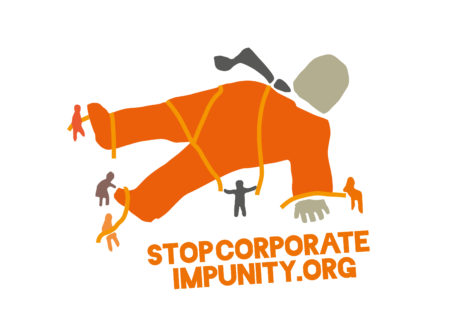27th August 2020
Re: Publication of the “second revised draft” for the negotiation of the “International Legally Binding instrument to regulate the activities of transnational corporations (TNCs) and other business enterprises with regard to human rights”.
The member organisations of the Global Campaign to Reclaim People’s Sovereignty, Dismantle Corporate Power and Stop Impunity take note of the publication of the second revised draft of the binding treaty. Published on August 6, 2020, the new text is the basis for the negotiation of an international legally binding instrument on transnational corporations (TNCs) in the field of human rights. It is part of the process initiated with the adoption of Resolution 26/9 of the United Nations Human Rights Council and as a result of the debates established at the fifth session of the Intergovernmental Working Group in October 2019.
It is necessary to recall that the purpose of developing international instruments for the protection of human rights is to address violations that have been perpetuated and remain unanswered, and is the result of the historical struggles of social movements and affected communities, as well as of legal advances made over decades, with the ultimate goal of broadening the spectrum of guarantees to human dignity.
To be in line with the logic and rationale of Resolution 26/9, the Binding Treaty must be a legal instrument that takes a step forward from those that already exist at international level. For example, it must innovate beyond the UN Guiding Principles which, although they have played a role in the process to date, are insufficient to close the accountability gap of TNCs and guarantee access to justice for those affected by their operation. The binding treaty has to address the legal regulatory vacuum that currently exists in relation to TNCs.
Therefore, after a first reading of the new draft, we would like to express our concern about problematic aspects of the draft that we fear will prevent the future instrument from achieving its goal of regulating the activities of TNCs. In general, despite some positive developments, the draft still follows the line of the previous one in being weak in those fundamental aspects needed to achieve its real objective as foreseen by the mandate established by Resolution 26/9. It is as if the present treaty has lost its soul.
Firstly, the extension of the scope to all enterprises, without distinction, is maintained and exacerbated, contrary to the historical purpose of the instrument and to Resolution 26/9 which clearly refers to enterprises “with transnational activity”. Furthermore, it is necessary to highlight that many of the proposals made by social movements, representatives of affected communities and even states during the fifth session were not included. Among others, we highlight: the absence of recognition of obligations for TNCs to respect human rights ; the failure to refer to global value chains, pillars of the international corporate architecture; the lack of effective international legal mechanisms to implement the Treaty and to sanction in case of non-compliance, such as the proposal for an international court ; and the lack of unequivocal recognition of the primacy of international human rights law over any other legal instruments, in particular over trade and investment agreements. We are also alarmed by the deficiency of provisions to effectively address the problem of corporate capture, a central issue in neutralising the drastic power asymmetries between big TNCs and states, especially in the global south.
In addition, the draft treaty again fails to impose joint and several liability on all companies involved in a violation along the global value chain and in general weakens the previous text regarding the liability of parent and/or controlling companies.
These deficiencies represent a great risk to the effectiveness of the treaty, diluting efforts to regulate all aspects of the transnational corporate architecture and put an end to the resulting impunity. Instead, as it stands, the draft opts for more generic provisions, and ultimately depends on the political will of nation states. In short, we are faced with a draft treaty that has been strongly emptied of its transnational scope, that is, of its raison d’être.
We would like to raise a last important element. A negotiation such as this one, where the presence and active participation of civil society, in particular of groups representing those affected by violations, as well as of social movements, has consistently been one of the central pillars of this process, must take into account the circumstances generated by the Covid-19 pandemic. There are many obstacles to guaranteeing a satisfactory participation in the negotiations, including the ongoing crises affecting many countries especially in the Global south, to the impossibility or risk associated with traveling and being present at the negotiation. The pandemic also creates serious challenges for supporting and mobilising communities and people involved in bringing their demands to the negotiation table. It is clear these challenges will not allow us to engage in a way that lives up to the importance of this treaty.
In this sense, we consider that the adequate conditions are not given for the sixth session of the Working Group to proceed as a negotiating session, and that instead alternatives should be explored, as for example to have consultations on the new draft, which must meet clear conditions to ensure the inclusiveness and participation of civil society. Carrying out the negotiations in a context where social participation is diminished runs the serious risk of compromising the essential contribution of civil society actors, in particular from those affected by the activities of TNCs. To attempt to advance in these conditions would therefore deteriorate the legitimacy of a process that has been very rich up to now, precisely because of the active participation of a broad spectrum of actors, in particular of civil society and affected peoples.
For more details contact: Raffaele Morgantini (contact@cetim.ch)
More information: https://www.stopcorporateimpunity.org/binding-treaty-un-process/

